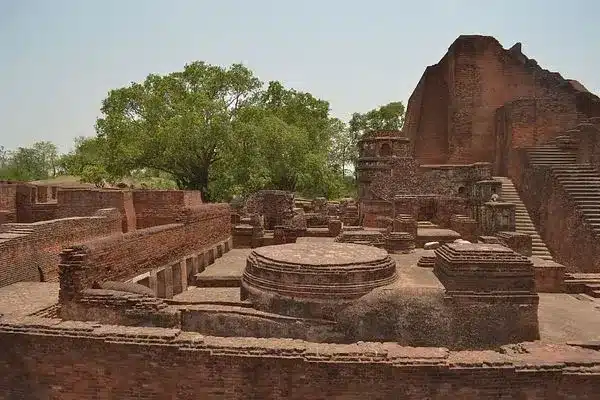About Nalanda University:
- Nalanda stands out as the most ancient university on the Indian Subcontinent.
- It was founded by Kumar gupta of the Gupta dynasty in Bihar in the early 5th century, and it flourished for 600 years until the 12th century.
- During the era of Harshavardhan and the Pala monarchs, it rose to popularity.
- It was a center of learning, culture, and intellectual exchange that had a profound impact on the development of Indian civilization and beyond.
- Nalanda was a monastic establishment in the sense that it was primarily a place where monks and nuns lived and studied. It used to teach all the major philosophies of Buddhism.
- It had students from far-flung regions such as China, Korea, Japan, Tibet, Mongolia, Sri Lanka, and Southeast Asia.
- The students at Nalanda were expected to follow a strict code of conduct and were required to participate in daily meditation and study sessions.
- Subjects such as medicine, the ancient Indian medical system Ayurveda, religion, Buddhism, mathematics, grammar, astronomy, and Indian philosophy were taught there.
- It continued to be a centre of intellectual activity up until it was destroyed in the 12th century AD, in 1193, by Turkish ruler Qutbuddin Aibak’s general Bakhtiyar Khilji.
- After six centuries, the university was rediscovered in 1812by Scottish surveyor Francis Buchanan-Hamilton and later identified as the ancient university by Sir Alexander Cunningham in 1861.
- The Chinese monk Xuan Zang has offered invaluable insights into the academic and architectural grandeur of ancient Nalanda.
- It is also a UNESCO World Heritage Site.
Q1: What is the Gupta Dynasty?
Gupta dynasty, rulers of the Magadha (now Bihar) state in northeastern India. They maintained an empire over northern and parts of central and western India from the early 4th to the late 6th century CE. Among the products traditionally thought to be from the Gupta era were the decimal system of notation, the great Sanskrit epics, and Hindu art, along with contributions to the sciences of astronomy, mathematics, and metallurgy.
Source: PM Narendra Modi to inaugurate Nalanda University in Bihar today | Things to know about the campus
Last updated on February, 2026
→ UPSC Notification 2026 is now out on the official website at upsconline.nic.in.
→ UPSC IFoS Notification 2026 is now out on the official website at upsconline.nic.in.
→ UPSC Calendar 2026 has been released.
→ UPSC Final Result 2025 is expected to be released in the second week of April 2026.
→ Check out the latest UPSC Syllabus 2026 here.
→ Join Vajiram & Ravi’s Interview Guidance Programme for expert help to crack your final UPSC stage.
→ UPSC Mains Result 2025 is now out.
→ UPSC Prelims 2026 will be conducted on 24th May, 2026 & UPSC Mains 2026 will be conducted on 21st August 2026.
→ The UPSC Selection Process is of 3 stages-Prelims, Mains and Interview.
→ Prepare effectively with Vajiram & Ravi’s UPSC Prelims Test Series 2026 featuring full-length mock tests, detailed solutions, and performance analysis.
→ Enroll in Vajiram & Ravi’s UPSC Mains Test Series 2026 for structured answer writing practice, expert evaluation, and exam-oriented feedback.
→ Join Vajiram & Ravi’s Best UPSC Mentorship Program for personalized guidance, strategy planning, and one-to-one support from experienced mentors.
→ Check UPSC Marksheet 2024 Here.
→ UPSC Toppers List 2024 is released now. Shakti Dubey is UPSC AIR 1 2024 Topper.
→ Also check Best UPSC Coaching in India




















